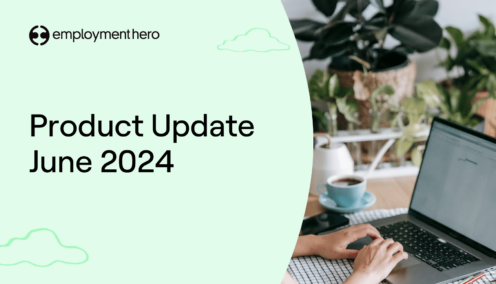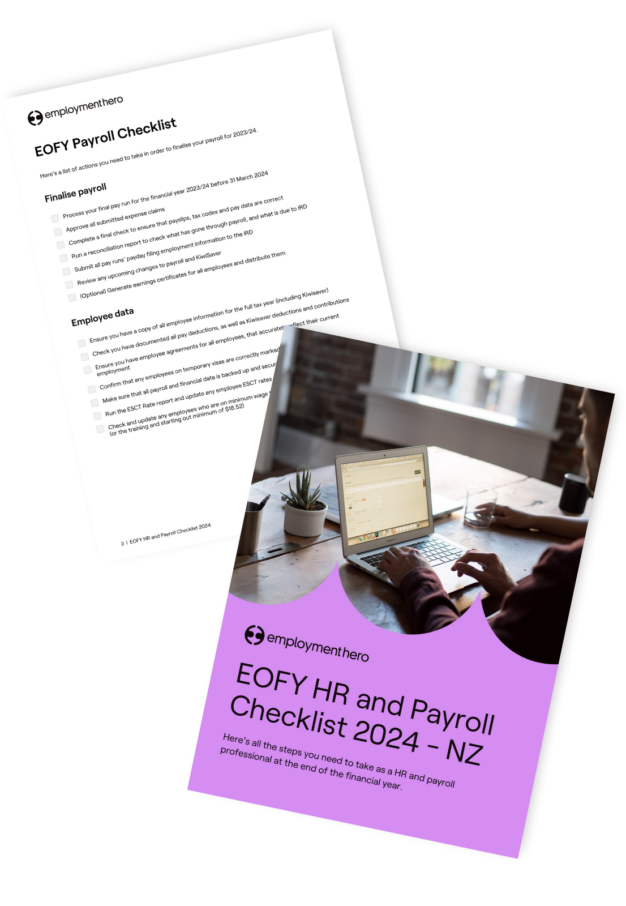
For HR and payroll professionals, the end of the financial year (EOFY) can be a hectic time. Whether it’s balancing the books, taking stock of your employee data or running crucial reports, there’s always plenty to do before the end of March.
If you’re the type that enjoys ticking off a to-do list, we’ve got something to make your busy period more rewarding. Our EOFY HR and payroll checklists for 2024 include all the tasks you’ll need to complete in one handy place. We’ve got two versions, depending on what applies to you.
In the Employers’ version of the checklist, we’ll cover:
- Key Inland Revenue (IRD) submission dates
- Tasks to finalise payroll
- Data checks to complete
- Culture and goals review
- HR policies checks
- Workforce planning
In the Outsourced Payroll Providers’ version of this checklist, we’ll cover:
- Key Inland Revenue (IRD) submission dates
- Tasks to finalise payroll
- Reconciliation reports
- Data checks to complete
Download your end of financial year checklist for 2024 today.

When is the 2024 EOFY in New Zealand?
For most businesses in New Zealand, the official end of the tax year is 31 March 2024. This means that businesses should consider the 2023-2024 financial year as being between 1 April 2023 and 31 March 2024.
There are some exceptions, usually for industries who will be operating in their peak season during March. Those industries are given what is called a recognised balance date, and eligible businesses can apply to IRD to use these dates as an alternative to 31 March. If they don’t apply for the alternative balance date, their end of tax year remains 31 March.
The industries eligible for a recognised balance date are:
- Beekeeping: 30 November or 31 December
- Childcare or education services: 31 December
- Cattle farming: 31 May
- Dairy farming: 31 May, 30 June or 31 July
- Sheep farming: 30 June
- Fishing: 30 September
- Horse breeding: 31 July
- Kiwifruit growing: 31 January or 28 February
- Meat processing or exporting: 31 August or 30 September
- Pip fruit growing: 30 June or 31 December
- Seed dressing: 30 November
- Tobacco growing: 31 July
What documents do employers need for income tax reporting?
Employers will need to have access to up-to-date documentation from the entire financial year. That includes employee info, bank statements, business expenses, payslips, pay run submissions and more.
That’s where effective data recording comes in handy. If you’re looking to save a lot of time at the end of the tax year, having HR and payroll software that automatically collects information safely on the cloud could mean that getting all the data you need takes just a few clicks.
How can NZ employers prepare for EOFY?
Apart from following our EOFY checklist, businesses should ensure they take all the relevant steps to prepare. Check out our blog which takes you through all the key steps.
What forms need to be filed at the end of the year?
Following the 31 March 2024 balance date, a business income tax return is due on 7 July 2024. As a business, you will need to file a company’s income tax return, known as IR4.
You will also need to include a complete copy of financial records from your business. Alternatively, you can submit the form IR10 which allows you to summarise your income and expenses.
What are some common payroll deductions for NZ businesses?
The end of the financial year is often a time when you’ll review the deductions you’ve made through payroll – both for reporting and to ensure you’ve made the correct deductions throughout 2023-2024.
There are several payroll deductions that New Zealand businesses will commonly make, although they vary by employee. These include:
- Kiwisaver employee contributions;
- Student loan deductions;
- Child support payments;
- PAYE; and
- Employee superannuation contribution tax (ESCT).
What other admin tasks should be done at the EOFY?
For HR and payroll professionals, the EOFY can be a great time to take stock. Check that your employee data is accurate across the business, whether that’s visa status or employment agreements. With a new minimum wage coming into effect from 1st April 2024, it’s also important to check that your employee pay will reflect that.
You’ll also need to complete your last payday filing of the year, as well as reconcile your payroll data with what has been reported to IRD, to ensure that it all balances. That includes reviewing employer superannuation contribution tax (ESCT) rates for all employees.
From a HR perspective, use this time to check in on company and individual goals for the next year. Whether that’s refreshing your company values or improving your performance review system, make sure your team is well supported to take the company through a successful year ahead.
How can NZ employers best prepare for the next financial year?
Preparing for a financial year doesn’t have to be hard. Here’s a few tips to help you feel prepared for the 2024-2025 financial year.
Record-keeping is crucial
How are you currently storing your data? If the EOFY comes with a whole lot of dread as you realise you’ll be searching through endless stacks of paper or digital files, it’s probably time to overhaul your record-keeping process. Consider how you can make safe and effective data storage part of the routine.
This is something that HR and payroll software can help with. Every data entry is stored securely along the way and can be accessed in a variety of forms, making downloading up-to-date reports at the end of the year a breeze. Goodbye double data handling!
Stay on top of deadlines
There are plenty of dates to be aware of when it comes to running a business, from public holidays to IRD submission dates. Don’t forget that all income tax returns should be filed for 2023-2024 by 7 July 2024, and your income tax bill is due by 7 February 2025. This isn’t just crucial as a legal compliance issue, but ensures your cash flow for the next year is correct and going to the right places.
It’s really important that if you don’t think you’ll make the deadline, you’re clear with IRD with plenty of time in advance.
See a new tax year as an opportunity
For many people, getting through the end of a tax year can seem like a whole lot of admin. However, just as spring cleaning leads to a sparkling home, think of a new tax year as an opportunity to do things better.
Here’s your chance to try new things, refresh how you organise employment and payroll, and see how your business can flourish. Plus, you’ve got a nice clear deadline to work towards. What can you do before 31 March 2025 to make employment easier?
Simplify your businesses payroll reporting with Employment Hero
Imagine if you could tick off so many EOFY tasks in one go, by storing key information and making IRD submissions on one secure digital platform.
Our all-in-one HR, payroll and benefits platform makes record-keeping, reporting and workforce management easy at EOFY. Learn more about how we can help you at tax time by speaking with one of our small business specialists today.
Download the end of financial year checklist now.




